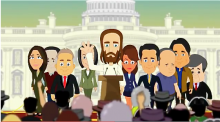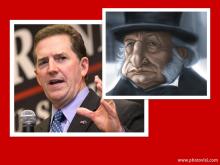There are many things they seemed to hold in common, not least an instinctive nonviolence, contrasting so sharply with the police, who so often let the logic of force drive their actions (they found out, as often in history, that the logic that works with criminals doesn’t really apply to idealists).
Economic Justice

Oh, how I love the Irish. Sure, I'm biased, being half a Celt myself with legion cousins still living on the old sod. (Shout out to the Bradys and Caffreys in Ballyjamesduff!)
As a self-confessed Gaelophile, I've been following the various Irish Occupy groups on Facebook for several months now, and they are endlessly entertaining — and interesting. The Occupy movement in the States is, largely at least, missing at least one key component: A sense of humor. The Irish Occupiers seem to understand that you can catch a few more flies with honey — and a good laugh — than you can with angry chants and somber rhetoric.
When I heard about a surprising turn of events at the County Cork occupation last month, I thought, That's brilliant. On Christmas Eve, members of the Occupy movement in the southern city of Cork found a present underneath the Christmas tree in their Peace Park encampment. It was a package containing a letter from "Santy" Claus, which read in part, "Dear people of Cork: Inside is a present, a gift from me to you, from all of us here at the North Pole."
The gift package also held the key to a padlocked, vacant, seven-story office building in the city center, and a list of instructions.
Earlier this week, I wrote about how nostalgia expressed in contemporary politics points to the privilege of those longing for the “good old days.” In doing so, I stumbled onto a theme I’ve decided to explore throughout the week. Namely, I’m interested in how it is that inspired vision – unconstrained by “what ifs” or fear of change – might break down barriers to opportunity and help overcome systemic privilege that holds some people back from realizing the same potential as others who are more fortunate.
I wrote an article a little while back about the lingering effects of colonial power on institutional education, and how it continues to limit access for those without certain privilege to connect with it. Well, it turns out there are some folks already trying to do something about this, and it’s pretty exciting.
Sebastian Thrun, a professor at Stanford in computer science, worked recently with Google to create a revolutionary self-driving car. As if this wasn’t enough, Thrun went on to develop an idea that would at once shift the educational landscape across the planet.
Richard Wilkinson on TED.com: How economic inequality harms societies
We feel instinctively that societies with huge income gaps are somehow going wrong. Richard Wilkinson charts the hard data on economic inequality, and shows what gets worse when rich and poor are too far apart: real effects on health, lifespan, even such basic values as trust.
Watch Wilkinson's TED talk inside the blog...

GOOD.is reports that some lucky customers of France’s oldest bank have had their loans forgiven, in a gesture that marked the Crédit Municipal de Paris’s 375th anniversary (or is that anniversaire?) The bank has a history of looking out for its customers and was in fact founded (in 1637) as a bank that would give “the needy access to fair banking” — something that was certainly not commonplace in the 17th Century.

She bit her bottom lip first, then lifted her gaze to my unassuming face. When she started looking at me softly, like I was some sort of oft-beaten puppy, I knew what was coming.
“I’m so sorry,” she whispered, “but your card’s been declined.” I offered a solution.
“Huh. Want to try it again?” Unsurprisingly, nothing changed, save her face, which only contorted more.
“Weird,” I said. The steam tauntingly danced on my cheeks. “Let me go check with my bank and figure it out.” I walked to a table, leaving the coffee, and pulled out my computer. After entering my username and password, my statement appeared on the screen.
“Available Balance: -$10.41,” it read.

It was a record year for U.S. farmers in 2011, with farm income topping $100 billion. This includes sales of $22 billion in fruits and nuts and $21 billion in vegetables and melons — crops that rely on immigrant farm labor.
But even as U.S. farmers prospered in 2011, those working on farms had less to celebrate.
The nation’s agricultural mecca — Fresno Country, California — had the state’s highest agricultural sales ($5.9 billion) and its highest poverty rate – 27 percent. More than 36 percent of the county’s children were poor, also the highest rate in the state. As one agricultural expert puts it, “High farm sales and high poverty rates often go together.”
Low wages, the seasonal nature of agricultural work, and, for many, unauthorized immigration status make it difficult for farm workers and their families to escape poverty. Farm workers’ high poverty rates aren’t totally attributable to immigration status, but it’s certainly one of the causes: 71 percent of all hired farm workers in the United States are immigrants, and about half of them are in the country illegally.

Fight global poverty, invest in agriculture. ~ Growers First
As the winter winds bite at our collars, a hot cup of coffee is a perfect antidote for healing. But what you might not consider when you sip a mug of dark roast is the economic injustices that many coffee growers around the world face.
Coffee is one of the largest cash crops in the world – the U.S.D.A. Foreign Agricultural Service reports that last year 15,689,340,000 pounds of coffee were distributed worldwide. Yet, indigenous coffee growers see only a tiny fraction of its revenue.
These are some of the reasons why fair exchange programs such as Growers First got into the coffee business — to tip the scales of economic and social inequity that has become a way of life for many coffee farmers globally in a more just direction.
Even more importantly, Growers First exists to transform lives. The non-profit based in Laguna Beach, Calif., has a powerful story of action, conflict, struggle — and ultimately hope.

The video will be a satirical take on the Sermon on the Mount with various quotes, signs and policy positions of the Tea Party. While I don’t think the creators of the video would argue that this same test be applied to every piece of legislation Congress considers, it is an interesting experiment.
How often do we divorce the things we say and do or the beliefs we hold from what we read in the Gospels about the person and teachings of Jesus?
This video will drive some conservative Christians nuts for two reasons.
First, because there are conservative Christians, such as Chuck Colson, who have spoken out against Ayn Rand and don’t want to be lumped in with her followers.
Second, because Rand’s influence is real and it’s not a good thing.
Rand’s extreme individualism turns Christian virtue into vice and vice into virtue. Her worldview feeds selfishness and a disregard for our neighbors. I read all 1,046 pages of my paperback copy her Atlas Shrugged and I would like at least 700 pages worth of my time back.
On a recent trip to the African nation of Ghana, Bono of U2 and economist Jeffrey Sachs spoke to the U.K. Guardian newspaper about their hopes for the future of foreign aid.
"There's one thing that might help with aid cynics. Because clearly no one likes the culture of dependency," Bono said. "No one's arguing for it. We're arguing to end it. I think there's something a bit funky about aid as it stands right now. The two most important parties involved in the transaction – the taxpayer who's providing the resources and the person who needs those resources to stay alive or keep their family alive – are the two people who know the least about what's going on. So that has to change."
Last week, Stephen Colbert announced that he is exploring a possible presidential run in 2012, and put Comedy Central compatriot, Jon Stewart, in charge of his Super PAC. Because of the strict FEC separation of super PAC and candidate, Stewart will have to determine what to do with all of the Colbert Super PAC's money on his own.
What do you think he should do with the PAC monies?
Watch Jon explore the possibilities inside the blog...

If you’re on Twitter, you may well have a few people that you follow with such enthusiasm that it occasionally feels a little like you’re stalking them. You re-tweet every article they post, nod along with every inspiring tweet they type and include them in your Follow Friday list every week.
Even if that’s not true for you, it’s certainly true for me of one person in particular — Umair Haque.
Haque is a self-titled “author, blogger, thinker, reformer.” But the more I read of his work, the more inclined I am to add the title “prophet” to that list of descriptors.
Haque is a prophet in the sense that he is preaching a message that is for a specific group of people (those who are disenfranchised but not quite cynical enough to give up yet) at a specific point in time (now, in a time of economic malaise). His words cut right to the heart of what has been going wrong in our world, and they are words that many, many people need to hear.
So it was with great relish that I purchased his new digital book, Betterness: Economics for Humans, excited to hear these words.
It was not exactly like the occupations of Wall Street or Boston, of Oakland or Seattle.
Rod House’s “wee encampment” was a one-man occupation on the library grounds in LaVeta, Colorado, population 906, some 65 miles southwest of Pueblo. He was so horrified by what he saw happening to protesters in other cities he was at wit’s end.
“I’ve got to do something, but I’m 71 years old,” House said.
So on Black Friday, that day that represents consumer society on steroids, House, an Air Force veteran, pitched his tent on the library grounds, determined to make his own stand for a better world. He was there simply as individual standing against the power of money that has corrupted politics.
It's always encouraging to see musicians using their unique platform to inspire social change.
When it comes to an indie supergroup such as New Party Systems — compirsed of members from TV on the Radio, Notekillers, and Liturgy — disparate audiences are drawn together for common purpose: economic justice.
New Party Systems's song "We Are," which dropped on the web yesterday, draws attention back to what the Occupy Movement is: A place of rising consciousness, full of energy and passion to bring about change.
While it may seem that the Occupy Movement is losing its steam, this expression reminds us its the spirit is alive — and growing.
The Occupiers have returned to Zucotti Park!
The barricades that have kept them out since the park was cleared November 15 are gone and steady streams of protestors are returning to their adopted home.
It remains to be seen whether the camp will be allowed to return to its former glory, or whether the security guards who have been controlling entry to the plaza will keep the returning protestors on a tight leash. According to The Associated Press
One security guard told a group of protesters: "No sleeping bags allowed, either, OK, folks?"
When you hear the phrase “the 99 percent,” many different images and ideas come to mind. Much of the mainstream media has depicted the Occupy Movement in a negative light and its participants as "dirty hippies," radicals, stoners or losers.
That’s why Brooklyn photographer Vanessa Bahmani decided to let the 99 percent portray themselves.

Sen. Jim DeMint recently released a plan to cut the federal deficit with $4.2 trillion in spending cuts. And guess what he wants to cut?
Seventy percent of the cuts would come from safety net programs that assist low-income people, including eliminating the earned income-tax credit and child tax credit.
Even an analyst for the American Enterprise Institute objected, saying, "It's comprised completely of spending cuts and no tax increases, but then targets the lower-income programs while sparing the big middle-class programs. They could have designed a spending-cut program that was more balanced …”
The news brought to mind a parable from the mid-1800s.
In the opening scene of Charles Dickens’ A Christmas Carol, Ebenezer Scrooge is approached by two earnest gentlemen. "At this festive season of the year, Mr Scrooge,'' said the gentleman, taking up a pen, ``it is more than usually desirable that we should make some slight provision for the Poor and destitute, who suffer greatly at the present time. Many thousands are in want of common necessaries; hundreds of thousands are in want of common comforts, sir.''
Something’s wrong here: The United States is the most charitable nation in the world, and yet nearly half of Americans are classified as poor/low income, with 16 percent now living below the poverty line.
This week, the Charities Aid Foundation released the 2011 World Giving Index, a comprehensive study that ranks countries by their generosity. The study, gleaned from 150,000 interviews with participants in 153 nations, focused on three categories: monetary donations, time spent volunteering, and willingness to help a stranger.
This year, the United States topped the list, up from fifth place in 2010.
While the amount of money Americans give to charity has not increased markedly, the study found a 4 percent increase in volunteering time, and an 8 percent increase in helping a stranger. (While this may not seem like drastic change, one percent means thousands of people.)